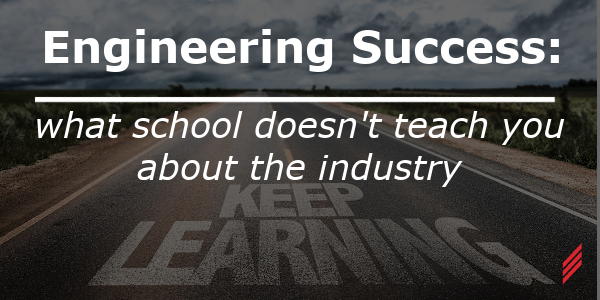Engineering Success: What School Doesn’t Teach You About the Industry
by Emmanuel Attah on Apr 24, 2025 10:30:00 AM

Where This All Started
“School is a scam.”
“You don’t use what you learn in college in the real world.”
We’ve all heard these statements and reacted in different ways. Some take them at face value. Others reject them without much thought. People say these things for many reasons—maybe because of a tough job market or ending up in a field unrelated to their degree. While I could debate the accuracy of these claims, what interests me more are the people who succeed regardless of what reality is. The ones who land jobs, and even better, jobs they love. That’s what brought me to Vermont in the middle of winter.
I am Emmanuel Attah, a sophomore mechatronics engineering major at Elizabethtown College in Lancaster, Pennsylvania. I enrolled in a study-abroad semester at the Greenway Institute in Montpelier, Vermont—an innovative engineering education program focused on sustainable development and preparing industry-ready engineers. It’s a work-integrated learning experience where I have structured classes combined with a hands-on engineering internship.
Through the Greenway program, I have spent the semester as an engineering intern at Hallam-ICS, an engineering consulting firm. At Hallam, I’ve assisted in drafting designs for mechanical and electrical systems, updated technical reports, and scoped real-world projects at places like Boston University and Vermont’s wastewater treatment facilities. It’s been a meaningful education—both as an engineer and as a professional. Through this internship and Greenway's reflection-based curriculum, I’ve explored what makes someone industry-ready. I’ve interviewed engineers, observed their work habits, and studied the patterns of top professionals.
The Successful Engineer
So, who gets the job? Who thrives in the field? In my experience, successful engineers embody two categories of traits:
- Engineering qualities—as learners and builders.
- Professional qualities—possessing the ability to be pro and relational.
The Engineering Qualities
Learners are curious. They seek knowledge and admit what they don’t know—then find the answer. They live by the principle of continuous improvement. Frequently, Hallam-ICS holds knowledge transfer sessions, where an engineer teaches the team about an area of their expertise. Great engineers embody and prioritize continual learning.
Builders think in stages, process ideas in layers, and approach failure like a temporary detour. Their mindset is constructive, literally and figuratively. Engineering is a ‘creative’ industry. I’m always amazed at the projects we work on at Hallam-ICS, from process engineering at university labs to Programmable Logic Controller (PLCs) in manufacturing lines. Engineers make their impact by building.
Professional Qualities
Professional skills differentiate good engineers from great engineers. Those who succeed don’t just know their craft; they know how to communicate it.
Professionalism is the signal that carries your technical skills to the world. If your signal is weak, the message doesn’t land.
I found two characteristics of successful professionals in the phrases "Be pro" and "Be relational."
- Be pro is a phrase I encountered at Hallam-ICS, popularly used by engineering director Bill Neuburger. It’s more than a motto—it’s a standard. Being pro means doing your best work, always. Not waiting to “become” a pro but choosing to be one now. This mindset changes everything. I try to live by this in my design work, putting my best forward even if it seems unimportant or unnecessary.
- Be relational is a phrase with multiple definitions. In the industry, it is about focusing on your service to your clients. To the engineer, it is service to the public good. One key facet of service in engineering is safety. I have met zero engineers without a safety focus. As engineers, we are charged to protect lives and property. And great engineers embody these principles to the utmost.
Being relational means giving credit, providing mentorship, and sharing insights. The best engineers I know are always thinking about the growth of the people they lead. The multiple opportunities that I’ve had to visit work sites all came from engineers on the team who thought about my learning and development.
And just as importantly, great engineers know how to advocate for themselves. Kosuke, a senior mechanical engineer I spoke with, put it this way:
“You want to talk about your achievements and how you contributed and added value.”
The ability to communicate your impact—clearly and confidently—is what sets people apart.
So Why Am I Telling You This?
Because I want to challenge the idea that school is a scam.
It’s not. But it can be—if we go through it passively.
School is what we make of it. It is an opportunity to become the kind of professional who thrives: a curious learner, a resilient builder, and an individual driven by purpose and excellence.
Even within the college setting, you can build yourself to become the person who succeeds in the field. Join projects. Take classes that excite you. Get involved in leadership. Going back to conventional college, I plan to engage with my classes not just for a grade but for my learning. I aim to cultivate my curiosity through hands-on projects and applicable coursework. And seek opportunities to serve my community with my time and skills.
Redefine what school means to you. Because at the end of the day, engineers are just people—people with specific skills tuned to the needs of a technical world. The qualities that make a great engineer? They make a great person, too.
The Ascent Begins
I started this blog with statements that led me to pursue answers. I dug my feet into the dirt—in all wise—and learned what separates the professionals who win from those who drift. These aren’t things they teach you in school. We’re told what to learn, but not how. We’re taught to build, but not to be builders. My learnings of the industry is only the beginning. We have to make a change. While the traditional college system may not always prepare us for the real world, the opportunities to grow are out there. I am stepping out to seize these opportunities. Will you?
About the author
Emmanuel works with the engineering team in the South Burlington, VT office as an Engineering Intern. A sophomore at Elizabethtown College in Elizabethtown, PA, Emmanuel is majoring in Engineering with concentrations in Mechatronics, Robotics, and Automation.
About Hallam-ICS
Hallam-ICS is an engineering and automation company that designs MEP systems for facilities and plants, engineers control and automation solutions, and ensures safety and regulatory compliance through arc flash studies, commissioning, and validation. Our offices are located in Massachusetts, Connecticut, New York, Vermont and North Carolina Texas, Florida and our projects take us world-wide.
You May Also Like
These Related Stories

What an SDS Doesn’t Tell You About Combustible Dust

How to Deploy a Hach B7000i Total Organic Carbon (TOC) Analyzer



No Comments Yet
Let us know what you think